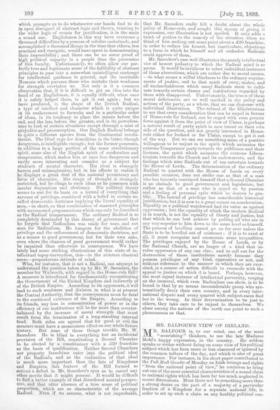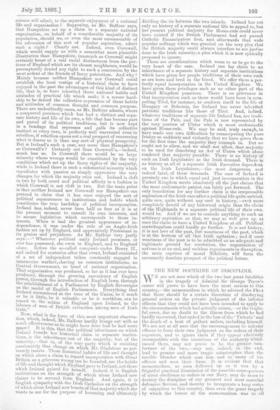MR. BALFOUR'S VIEW OF IRELAND.
MR. BALFOUR is, to our mind, one of the most " nourishing " thinkers, to use the late Madame Mohl's happy expression, in the country. He seldom speaks or writes without fixing on some view of his political subject which has been more or less obscured. or ignored by the common talkers of the day, and which is also of great importance. For instance, in his short paper contributed to the Pall Mall Gazette of Monday on Irish wrongs and rights "from the national point of view," he contrives to bring out one of the most essential characteristics of a sound claim to national rights which has been far too much neglected in recent discussions. Must there not be something more than a strong desire on the part of a majority of a, particular fraction of a Kingdom for a separate national life, in order to set up such a claim as any healthy political con- science will admit, to the separate enjoyment of a national life and organisation ? Supposing, as Mr. Balfour says, that Hampshire set up a claim to a separate national organisation, on behalf of a considerable majority of its population, should we, or even the most unreasonable of the advocates of this sort of popular aspiration, admit such a right ? Clearly not. Indeed, even Cornwall, which would supply us with a somewhat more plausible illustration than Hampshire, inasmuch as Cornwall might certainly boast of a real racial distinctness from the por- tions of England which are its closest neighbours, would be peremptorily denied any right to such a concession by the most ardent of the friends of fancy patriotism. And why ? Mainly because neither Hampshire nor Cornwall could establish the least vestige of a, historical claim to have enjoyed in the past the advantages of this kind of distinct life, that is, to have inherited those national habits and attitudes of practical life which make it a severe hard- ship to be denied the collective expression of these habits and attitudes of common thought and common purpose. There are undoubtedly cases, as Mr. Balfour admits, where a conquered province which has had a distinct and sepa- rate history and life of its own, a life that has become part and parcel of its political traditions, but is now kept in a bondage that represses and galls its collective instinct at every turn, is perfectly well warranted even in rebellion, if rebellion opens out a real prospect of recovering what is slearer to it than any sort of physical prosperity. But is Ireland's such a case, any more than Hampshire's or Cornwall's ? Certainly not than Cornwall's,—indeed, much less so. In Cornwall there would be no large minority whose wrongs would be constituted by the very conditions which set up the fancy rights of the majority, while in Ireland there is such a substantial minority which repudiates with passion as simply oppressive the very changes for which the majority cries out. Ireland is cleft in two by both creed and political affinity in a fashion in which Cornwall is not cleft in two. But the main point is that neither Ireland nor Cornwall nor Hampshire can pretend to claim that it has once enjoyed the sort of political separateness in institutions and habits which constitutes the true hardship of political incorporation. Ireland has, indeed, never been half as free as it is at the present moment to consult its own interests, and to secure legislation which corresponds to those in- terests. When it had the greatest appearance of in- dependence, it was under the rule of an Anglo-Irish faction set up by England, and oppressively Protestant in its genius and prejudices. As Mr. Balfour very justly says :—" Whatever political unity Ireland possesses, or ever has possessed, she owes to England, and to England alone. Before the so-called conquest. under Henry. II., and indeed for centuries after that event, Ireland consisted of a set of independent tribes constantly engaged in internecine warfare,shaving no common institutions, no Central Government, no bond of national organisation. That organisation was produced, so far as it has ever been produced, through the growing ascendency of English power, through the introduction of English laws, through the establishment of a Parliament by English Sovereigns on the model of English Parliaments. Everything that Ireland surrendered at the time of the Union, be it much or be it little, be it valuable or be it worthless, can be traced to the action of England upon Ireland, to the labours of men of British extraction among men of Irish birth."
Now, what is the force of this most important observa- tion, which, indeed, Mr. Balfour hardly brings out with as much effectiveness as he might have done bad he had more space ? It is this, that the political inheritance on which Ireland founds her historical claim to separate institu- tions, is the inheritance not of the majority, but of the minority,—that is, of the very party which is resisting passionately that change on which Mr. Gladstone so per- versely insists. Those historical habits of life and thought on which alone a claim to regard incorporation with Great Britain as a grievous wrong can be founded, are the habits of life and thought which England gave to Ireland, not those which Ireland gained for herself. Indeed, it is English institutions on the strength of which alone Ireland now claims to be severed from England. And again, it is English sympathy with the Irish Catholics on the strength of which alone Ireland now boasts of that majority which she wants to use for the purpose of loosening and ultimately dividing the tie between the two islands. Ireland has not only no history of a separate national life to appeal to, but her present political majority for Home-rule could never have existed if the British Parliament had not passed Catholic Emancipation first, and afterwards that wide popular suffrage which was granted on the very plea that the British majority could always interfere to see justice done to the Irish minority, a plea which it is now cynically proposed to ignore. These are considerations which seem to us to go to the very heart of the case. Ireland can lay claim to no inheritance of a separate history and separate institutions which have given her people traditions of their own such as are born and bred in the blood. We offer them a per- fectly equal incorporation in the United Kingdom. We have given them privileges such as no other part of the United Kingdom possesses. There is no grievance in that incorporation such as there would have been in com- pelling Tirol, for instance, to conform itself to the life of Hungary or Bohemia, for Ireland has never inherited patriotic traditions like those of Tirol. And, indeed, whatever traditions of separate life Ireland has, are tradi- tions of the Pale, and the Pale is now represented by the very portion of Ulster which is most enthusiastic against Home-rule. We may be said, truly enough, to have made our own difficulties by emancipating the pure Irishry so suddenly and violently that we have given them for the first time the majority they triumph in. But we ought not to allow, and we shall not allow, that majority to be used for dissolving an Act of Union which alone rendered that majority possible. There is no history of such an Irish Legislature as the Irish demand. There is- no history at all of a separate Irish Executive dependent on the Irish Legislature,—tho most dangerous, and indeed fatal, of these demands. The case of Ireland is precisely one in which equal and just incorporation in the United Kingdom meets absolutely all the just claims that the most enthusiastic patriot can fairly put forward. The only foundation for any further claim is the irrepressible aspiration of the Irish race after a political life quite untried, quite new, quite without any root in history,—eveh more completely devoid of any historical origin than the claim of the Highlands to a separate political life of their own, would be. And if we are to concede anything to such an arbitrary aspiration as that, we may as well give up at once the claim to have a United Kingdom at all. Political centrifugalism could hardly go further. It is not history, it is not love of the past, but weariness of the past, which is at the bottom of all this Irish agitation ; and if once weariness of the past is to be admitted as an adequate and legitimate ground for revolution, the organisation of nations is at an end, and reckless experiments in disruption, the mere caprices of moral Nihilists, will form the- necessarily desolate prospect of the political future.



































 Previous page
Previous page